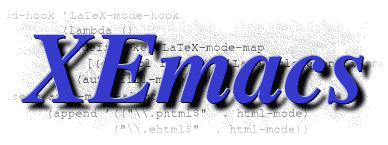
|
|
|
- Mailing lists
- Status of Services
- Near Future
- History of XEmacs
- XEmacs vs. GNU Emacs
- Screenshots
- Sites Created With XEmacs
- Year 2000 Statement
- Who Wrote XEmacs?
- XEmacs Contributors
- Website
Introducing XEmacs
XEmacs is a large open source text editor and application development environment (see http://www.xemacs.org). XEmacs is designed to be completely customizable, yet provides an attractive interface and has many advanced features built into it, so that it also works well "out of the box".
-
XEmacs runs on all modern versions of UNIX and on Microsoft Windows, and can display its frames on the X Window System, on Microsoft Windows, and on TTY (ASCII terminal) connections (even simultaneously!).
-
XEmacs has its own fully-featured extension language (a variant of Lisp called XEmacs Elisp) and an installable package system similar to the one that is part of the Red Hat Linux distribution. XEmacs extension packages include everything from a threaded mail and news reader, to special modes for nearly every common programming language, to implementations of games such as Minesweeper and Adventure.
-
The XEmacs development community consists of around ten core developers from seven countries in Europe, Asia, and North America, dozens of authors of large XEmacs extension packages, and hundreds of active beta testers. There is an established process for deciding whether patches are accepted that allows for a consensus among the core developers, similar to the Apache project.
-
The XEmacs project is about six years old, and was formerly named Lucid Emacs. XEmacs is not the same as GNU Emacs, and is not a part of the GNU project, although the two editors have a common ancestor. (At this point, most of the code in XEmacs has been rewritten, and significantly expanded upon from its GNU Emacs ancestor.)
-
The XEmacs code base consists of approximately 250,000 lines of C code and 100,000 lines of Elisp code, plus an additional 500,000 lines or so of Elisp code in the packages that are in the standard XEmacs distribution.
-
All of the source code to XEmacs is freely available under the GNU Public License.
Ben Wing
Site content repository: Primary mirrors: |
This page is part of the XEmacs website
<https://www.xemacs.org>
Contents copyright © 2000 -- 2017; all rights reserved. Missing links, inquiries about implementation, kudos to: webmaster@xemacs.org Discussion of XEmacs features, installation, problems: XEmacs mailing lists This page last modified Fri Mar 3 20:33:37 2017 UTC. |